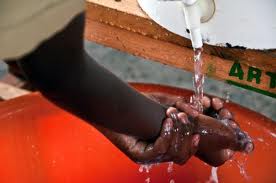Sudan must tackle sanitation problems at grassroots level: UNICEF
November 19, 2013 (KHARTOUM) – Sudan remains among the poorest performing countries in terms of access to sanitation and water facilities, UNICEF said in a statement to mark World Toilet Day on Tuesday.

UNICEF representative in Sudan Geert Cappelaerehas called for greater investment in water and sanitation at all levels to help bridge the gap within communities.
“We know that investing in water and sanitation has huge returns in terms of saving children’s lives. It is an investment in the health, livelihood and dignity of communities”, Cappelaerehas said.
“UNICEF will continue to support the Sudanese government and people in their quest to bring these global public goods into every town and village in Sudan”, he added.
The 2010 Sudan Household Health Survey (SHHS) indicates that only 27 percent and 60.5 percent of the population are using improved sanitation and water facilities respectively.
According to the findings, only 52 percent of the population washes their hands after using a latrine, while around 50 per cent of existing basic schools have no improved drinking water and sanitation facilities.
Cappelaerehas said investment in school and health facilities was urgently needed from federal and state levels, right down to community level.
A 2011 health statistical report found preventable diseases such as acute watery diarrhoea and respiratory infections are the leading causes of deaths in hospitals for children under five in Sudan.
In 2009, a declaration on sanitation was signed by the Sudanese ministers of health, irrigation and water resources, education, and environment and physical development.
According to UNICEF, Sudanese social workers and public health officers have since been given training in community approaches to sanitation and are now facilitating further training at community level, helping them to implement grassroots strategies on the ground.
Initiatives are based around promoting the pillars of hand-washing with soap; proper food handling; and hygiene practices at household level.
In Sudan, 131 communities are now open defecation-free, benefitting more than 180,000 people, with a further 200 communities initiated and trained in community approaches to overcome practices detrimental to public health and hygiene.
UNICEF said Sudan’s national water, sanitation, and hygiene (WASH) policy is currently awaiting endorsement. It establishes the basic right of every person to access improved sanitation, as well as individual responsibility to own and maintain sanitation facilities.
Toilets are still out of reach for more than 2.5 billion people – one-third of the global population. World Toilet Day is held annually on 19 November to help break the taboo around toilets and draw attention to the problems resulting from the lack of adequate sanitation.
(ST)
